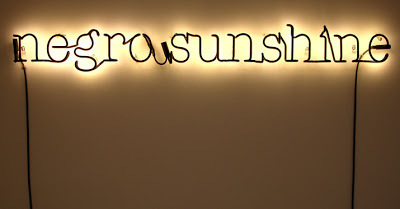#Occupy Post-Blackness?
 "negro sunshine"--Glenn Ligon
"negro sunshine"--Glenn LigonOccupy Post-Blackness?
by Wahneema Lubiano | special to NewBlackman
Assome of the contributors articulated in Toure's Whose Afraid of Post-Blackness, others in numerous pieces ofscholarship produced over the past decades, and still others in public discussionin various places, Blackness is both a form of chosen identity and, atthe same time, is an imposition from the larger social order. Under some circumstances thatimposition has coercive power and pressure behind it; we don't live solelywithin the terms of our own imaginations, not even in our own drama around thatidentity. That external impositionoften interrupts our identity reveries and speaks a pathology narrative aboutus and does so sometimes with and sometimes without our own consent. It is that understanding of theimposition of coercive history in the present moment that makes"post-blackness" inadequate as a rubric for accurately describing the effectsof structural racism, of white supremacy in the present. And Toure takes note of that fact inhis book.
But"post-blackness" is also situational—or, as Michael Eric Dyson asserts in theintroduction: ". . . Blackness bends to the tongue it tumbles from at any givenmoment of time" (xii). And it isin this regard that I'm interested to some great extent in specific situationalelements of the phrase's use: its use as a means to describe a moment incultural, artistic, or emotional self-understanding – yes, there indeed I cansee its usefulness and it is that usefulness that I'm addressing when I'mquoted in the book talking about why Dave Chapelle's show prompted me away fromany simple dismissal of the phrase when Toure first brought it up in ourconversation. I thought that thephrase was a useful way to describe what I saw as a kind of pre-figurativeexistence in Chapelle's work—he was performing possibilities of art—of humorand wit—that were not completely captured by the imposition of social blacknessboth across our history and in the present moment.
Yet,the phrase itself is redolent of past decades of anxiety about black art, blackcultural production—an anxiety exemplified in the 1926 fight, in the pages of TheNation magazine, between Langston Hughes ("The Negro Artist and the RacialMountain") and George Schuyler ("The Negro Art Hokum") around the burden ofrepresentation (as Stuart Hall has described it) for Negro artists. "Post-blackness" is a rubric thatreminds me that cultural producers are continually caught in the dilemma in theWest of a pressure to define themselves, to distinguish themselves, as mythicindividuals—that's the ur-narrative of U.S. individuality writ large; so, ofcourse, artists, other cultural producers, cultural critics, and we ourselvescontinually produce narratives of "generational shift"—it's a handy way to makeindividual space, to posit a conversational imperative, and have thatimperative recognized. And it doesn't much matter, when that posture is assumed,that space claimed, whether it is a new moment in fact or a seemingly new moment—the gesture ismeant to establish a possibility here and now. I find those repeated moments sociologically rich and interesting.
Butwhile I don't want to cast aspersions on that gesture, I do want to move ontosomething else that came up as we explored the gesture of Thelma Golden andGlenn Ligon, something that I'd love to talk about more, if people care to, andit's this: the social utility, the currency, of post-blackness. Let me makewhat I'm saying more concrete.
WhenToure asked me about the most racist thing that ever happened to me, my firstresponse (along with many of the other contributors he quoted) was to say thatstructural racism enacted itself in such a way that I wasn't personallyconfronted with the most racist things that had ever happened to me. But Toure pushed back on this; he pushedme to think about my earlier and younger understandings of racism: the moment priorto my arrival at an analysis of structural racism. He wanted me to speak about something that hurt way back when. So, I told a story from my high schoolyears and a bad encounter with a guidance counselor bigot because that storygave me a chance to talk about Howard University; being a student at Howard wasa moment of a kind of pre-figurative post-blackness for me. The most powerful take-away of thatstory was not the incident with the guidance counselor. What transformed my life was mydiscovery of a rich and complex existence within the terms of blackness (asituated blackness) at Howard University. I found ordinary life at Howard. (That was the saving grace.)
Myimagination's earned currency of post-blackness in turn contributed to a momentof real tension at the end of my interview with Toure when we were talkingabout Barack Obama, and he asked "How do we create more Barack Obamas?" In my response, I remember tellingToure that while Obama is certainly exceptional in that sense that he's theU.S. head of state, he is also ordinary; he is the matter-of-fact product ofhis class origins and his elite education. I know thousands of people who are proudly Black andintellectual, as Toure described him, but Obama's existence, like theirs, likeours, was largely a matter of chance and the specifics of history. An elite education produces a BarackObama or any number of other specific kinds of black—orother—intellectuals.
Itis the constraint of capitalism that restricts those numbers. My last sentence of that exchange was "AndI think capitalism is a really bad idea." I remember that Toure responded with "Wow, we'll really haveto talk about that sometime."
Thisthen might be a great time for all of us to talk about the currency ofpost-blackness within the terms of late capitalism in this moment of occupyeverywhere.
***
WahneemaLubiano is Associate Professor ofLiterature and African & African American Studies at Duke University. Lubiano is the editor of TheHouse That Race Built: BlackAmericans, US Terrain
Published on December 05, 2011 14:12
No comments have been added yet.
Mark Anthony Neal's Blog
- Mark Anthony Neal's profile
- 30 followers
Mark Anthony Neal isn't a Goodreads Author
(yet),
but they
do have a blog,
so here are some recent posts imported from
their feed.



